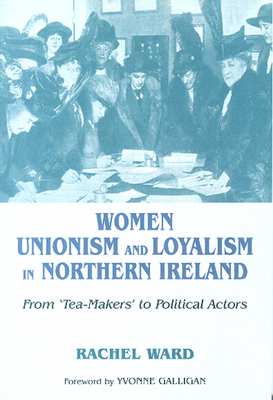Women and Unionism in Northern Ireland
Ruaírí Ó Dohmnaill reviews Women, Unionism and Loyalism in Northern Ireland; from 'tea-makers' to political actors by Rachel Ward, Irish Academic Press, ISBN 0 7165 3340 5, £20 pbk

ACADEMICS OF four universities have acclaimed this work, which is based on the author's doctoral thesis. Its aim, which at first sight, may not seem exacting, was to shed light on political participation of 'unionist and loyalist' women in the six counties.
Her "aim" is to demonstrate "that unionist and loyalist women are more active political participants than the tea-making stereotype suggests." (The stereotype was prompted by a comment "in a conversation with a local Belfast man of 'nationalist' political persuasion.")
It was a qualitative study, founded on thirty-seven interviews and on some "observer-participation". "A semi-structured style of questionnaire facilitated" the analysis of interviews. To those who prefer statistics-based research, results of qualitative studies may lack immediacy.
The choice of interviewees was "élite-driven", using a list of candidates for the Northern Ireland Assembly and a "snowballing" technique - requesting respondents to suggest other interviewees.
While claiming to be "British", interviewees' attitudes to nationality vary. One asserted that she would allow herself to be called "Irish" - "when she was away from home."
The author asserts: - "The term 'nationalism' is used to refer to the actions of a group united through culture, history, territorial claims and economic advantage or disadvantage." To many this may describe the circumstances in "Northern Ireland", excepting the omissions of "sectarianism" and "racism". Historically, unionists paraded both as their defining characteristics.
Males still dominate politics in the six counties but apparently without the Abercorns, Londonderries, bogus O'Neills or military gentlemen. Interviewees saw themselves bound by a particular "etiquette" which did not apply to republicans. Their role of mothers and helpers, was emphasised - "Mr Paisley has been known to say 'Go home and breed for your country.'…"
Respondents voiced some progressive - almost revolutionary - opinion. For example, there was objection to the unionist nostrum - "Ulster says 'NO'!" One respondent sometimes felt like a "Protestant republican" - like McCracken, Casement, Hobson and others? Another claimed to be a socialist. Another admitted that she was not "a religious Protestant." "Secular Protestantism" was denounced by The Grand Orange Lodge of Ireland as having "little time for worship or for observance of God's laws" and "will not save Ulster in its hour of need."
The atheist interviewee, should be reminded of John Locke's censure: "… neither Atheist nor Romanist had an absolute claim on society for toleration, because the one had undermined morality and the other the state."
Connolly Association, c/o RMT, Unity House, 39 Chalton Street, London, NW1 1JD
Copyright © 2006 Ruaírí Ó Dohmnaill

